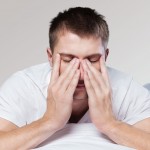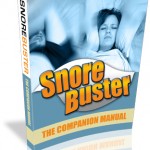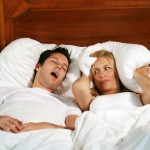It is believed that as many as ninety percent of people who have snoring sleep apnea are not aware that they have it. In the majority of cases it is the snorer’s bed partner who first becomes aware of the sufferer struggling to breathe during sleep.
Sleep apnea requires diagnosis and treatment before it becomes life threatening. Snoring and sleep apnea are different. Snoring alone involves making loud noises that are a result of breathing through restricted airways while asleep.
Snoring usually accompanies sleep apnea, which is caused by the airways becoming so obstructed during sleep that the sufferer is forced awake to breathe. These waking episodes can occur up to several hundred times a night. Although the sleep apnea sufferer is rarely aware of the waking episodes he or she will often be tired during waking hours.

Snoring Sleep Apnea Warning Signs
How to recognize sleep apnea?
Symptoms indicative of this condition include:
- frequently stopping breathing during sleep
- choking or gasping during sleep in order to fill the lungs with air
- loud snoring
- waking suddenly in order to start breathing again
- waking in a sweat at night
- feeling tired and lethargic in the morning even after a night of sleep
- headaches
- sore throat or dry mouth on waking
- memory loss and learning difficulty
Click Here To Manage Snoring Sleep Apnea With A Chin Strap
Types of Snoring Sleep Apnea
There are two types of sleep apnea:
- the more common obstructive sleep apnea (OSA)
- and the less common central sleep apnea (CSA).
A third type of sleep apnea, mixed sleep apnea, is a combination of OSA and CSA. Although sleep apnea and snoring are different, similar treatments may be recommended to treat both conditions.
Snoring is a common problem and is caused by vibrations of the tissues in the throat when they relax during sleep. Snoring in itself is not dangerous but it may be a symptom of sleep apnea.
Ways to stop snoring include sleeping behavior modification, weight loss, dental mouth guards, nasal dilators, snoring chin strap and medication. In addition to those snoring remedies, treatment for obstructive sleep apnea frequently includes continuous positive airway pressure or CPAP which delivers constant airflow under pressure via a face mask.
The CPAP machine is slightly larger than a toaster and is fully portable.
Other treatments options available for snoring sleep apnea include
- weight reduction
- avoiding alcohol before bed
- diathermy palatal reduction – a surgical procedure effective for sleep apnea and snoring
- surgical straightening of the septum which works well for sleep apnea and snoring
- removal of tonsils and/or enlarged adenoids
- and snoreplasty which involves injecting sclerosing agents into the palate and is only useful for snoring patients.
For more tips of how to help sleep apnea sufferers, click on this link.
It is important to note that a single treatment may not be wholly effective for treating snoring or sleep apnea and sometimes more than one treatment may be required.
Sleep apnea can cause many serious health problems if it is not attended to properly. It is important to consult a doctor or sleep specialist for diagnosis.
Do You Snore? Or Do You Have A Partner Who Snores?
If your answer to either of these questions is yes, then I strongly recommend that you check out the Stop Snoring Chin Strap.
This recently developed and proven product will eliminate your sleepless nights almost immediately. Discover the simple and effective way to wipe out snoring and a way that is safe for snoring sleep apnea patients.





